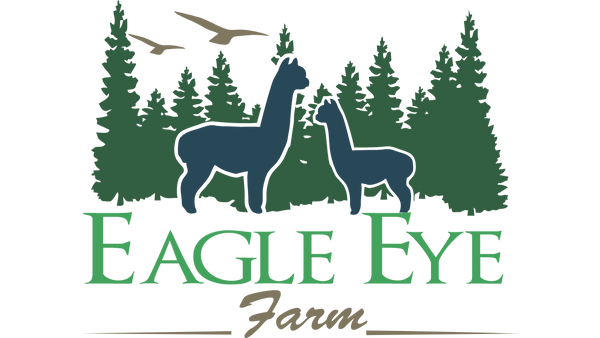
The Importance of Quarantine Practices at Eagle Eye Farm
Share
At Eagle Eye Farm, maintaining the health and safety of our herd is a top priority. Our farm is not just a home for alpacas but a place where farming practices are constantly evolving to ensure the well-being of our animals. Recently, an incident involving one of our alpacas highlighted the critical importance of quarantine protocols, serving as a valuable lesson in animal care.
A Lesson from Tilly's Arrival
A few weeks ago, Tilly, one of our alpacas, returned from a show in Oklahoma. Transported by another farm, she arrived alone - a situation that made enforcing quarantine challenging. Alpacas are herd animals, and isolating a single alpaca can cause significant stress and anxiety. Believing this stress might outweigh the benefits of quarantine, I decided to introduce Tilly directly into the pen with our other animals, including mothers and babies.
Two weeks later, signs of illness began to emerge. Essie, one of our alpacas, developed severe diarrhea, and Aggie, a young alpaca, suffered from dehydration so severe she required hospitalization. Lab tests later confirmed the presence of coronavirus in Essie's sample. Although Tilly showed no symptoms, it's possible she carried the virus from the show and unknowingly passed it to the herd.
The Role of Farming in Animal Health
Farming is as much about learning from experiences as it is about daily care. The incident with Tilly underscored the importance of quarantine, especially after participating in alpaca shows or introducing new animals to the farm.
The Alpaca Owners Association (AOA) recently released an email highlighting similar illness outbreaks at shows. This information validated our experience and reinforced the necessity of strict health protocols.
Moving Forward: A Commitment to Quarantine
At Eagle Eye Farm, we are committed to improving our practices to ensure the health of our animals. Moving forward, any alpaca returning from a show or arriving from another location will undergo a mandatory quarantine period. While this may present logistical challenges, the well-being of our herd is worth the effort.
For future shows, such as the potential 2025-2026 season, we'll explore additional safety measures, including designated quarantine spaces and enhanced monitoring. These steps are essential to protect the herd and prevent the spread of illness.
Sharing Knowledge for a Healthier Farming Community
This experience is a reminder that every farming decision carries consequences. Sharing these lessons is part of our commitment to fostering a healthier and more informed alpaca farming community. At Eagle Eye Farm, we believe in transparency and using our experiences to help others care for their animals effectively.
Final Thoughts
The health and safety of animals should always take precedence. While this situation was a learning moment for Eagle Eye Farm, it is also an opportunity to improve and educate. Farming is an ever-evolving journey, and we're committed to making it a safe and rewarding one for both our animals and our community.
If you're an alpaca owner or farmer, consider this a reminder to prioritize quarantine practices. Together, we can create a safer environment for all animals and ensure the continued success of the farming industry.
For more updates on farming practices and life at Eagle Eye Farm, stay tuned to our blog or visit us for a firsthand look at our alpacas and other animals.
